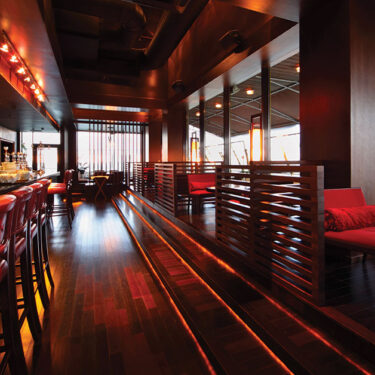A man is taking legal action against the popular restaurant chain Olive Garden after alleging that he found a rat’s foot in a spoonful of his minestrone soup during a March visit to the eatery’s Warren, Michigan, location. According to the lawsuit, the foot injured the inside of the diner’s mouth and caused him to get physically ill.
Featured Solutions
“It is very surprising,” said John Dewart, Senior Broker, Casualty, Burns & Wilcox, Chicago, Illinois. “This is certainly extreme, but accidents do happen. Fortunately, there are a lot of quality controls in place to prevent something like this from occurring.”

Mental anguish is one of those things that is a little ambiguous. It is not necessarily included in the definition of bodily injury in all insurance policies.
Legal defense, payouts and other costs associated with this type of lawsuit could be covered by a restaurant’s Commercial General Liability (CGL) Insurance, which is designed to address third-party bodily injuries and property damage. However, it is important to ask about coverage for emotional distress, said Jim Phillipp, Senior Broker, Casualty, Burns & Wilcox, Chicago, Illinois.
“Mental anguish is one of those things that is a little ambiguous,” Phillipp said. “It is not necessarily included in the definition of bodily injury in all insurance policies.”
For restaurants, no way to prevent allegations of wrongdoing
According to the Detroit Free Press, a health department visit to the Olive Garden involved in the alleged rat-claw incident revealed no sign of rodents in the building, and an Olive Garden spokesperson told the newspaper that they have “no reason to believe there is any validity” to the claim. The rat’s foot that the customer said was found in his soup showed “no signs” that it was cooked and did not take on the red color of the minestrone soup, Olive Garden parent company Darden Restaurants added in a statement, and the foot was “significantly larger” than their soup spoons.
“Certainly, this would be an anomaly, but there is no preventing the allegation of wrongdoing,” Dewart noted. “When their product leaves the kitchen and is set on the table, there are risks there, are there are risks for takeout orders too. Anyone can make any kind of allegation. We live in a very litigious environment, now more than ever.”
Some allegations of food contamination have turned out to be false, including an infamous 2005 case in which a Wendy’s customer claimed to find a human finger in her chili but later was found to have planted it there and eventually served four years in prison for the scam, according to NBC Bay Area. The ordeal was linked to an estimated $21 million in lost business revenue for the company, the outlet reported in 2010. Still, contamination incidents are not entirely uncommon. In June, an employee at Sonic Drive-In was arrested after police said his bag of cocaine was found in a customer’s hot dog, KATV reported. In 2022, a family in California filed a lawsuit seeking $200,000 in damages from Costco after purchasing halibut that they said contained live worms that were crawling in the product after it was cooked, City News Service reported in March of last year.
“There is absolutely skepticism” when it comes to these types of food-related incidents, Phillipp said. “There is a burden of proof to prove that this actually happened. Without that, it is really difficult,” he said. If it can be proven, he said, “the size of that lawsuit can be pretty large.”

One of the great things about the insurance policy is that there is a duty to defend. … Even if, at the end of the day, the claimant’s accusations are unfounded or unwarranted, there is still that duty to defend.
When a restaurant faces a lawsuit over this type of allegation, its CGL Insurance would typically respond immediately by providing defense coverage, Dewart said. “One of the great things about the insurance policy is that there is a duty to defend,” he said. “As long as the claim fits the mold as a covered loss under the policy, there will be a duty to defend and indemnify the insured. Even if, at the end of the day, the claimant’s accusations are unfounded or unwarranted, there is still that duty to defend.”
Business owners seeking CGL Insurance should consider the cost of legal defense when reviewing their coverage options, Dewart said, as “lawyers are very, very costly.”
“If your policy is only a few hundred thousand dollars, your legal expenses can add up very quickly,” he explained, adding that many restaurants may also want to consider Excess Liability Insurance. “They want to protect themselves by ensuring that their primary CGL Insurance is robust but also take on additional limits to account for situations like these, which — if a claim is brought to trial or settles — could be in the multi-million-dollar range.”
Insurance policy’s definition of ‘bodily injury’ may vary
Proving mental anguish without proof of a physical injury can be a challenge, according to Phillipp, and restaurants generally face a greater risk of these allegations after other types of incidents, such as foodborne illnesses, slip-and-fall accidents or physical altercations. For example, in a lawsuit recently filed against a sushi restaurant in Bozeman, Montana, over a food poisoning outbreak that sickened 40 individuals, at least one of the customers seeks damages for both physical and mental pain, emotional distress and anxiety, loss of enjoyment, and more, the Bozeman Daily Chronicle reported on May 11.
“It is more of a concern for bars and restaurants when you can actually prove some negligence for bodily injury,” Phillipp said. “If there was a fight or altercation at a bar, not only would a person potentially get injured but they could also claim more substantial mental anguish injuries than someone who accidentally eats something.”
Coverage under CGL Insurance for mental anguish could depend on the definition of “bodily injury” in the restaurant’s policy. “The biggest thing is the definition,” Phillipp said. “If the claimant can prove in court that they did sustain injury, then a business would want to make sure mental anguish is included in their policy. You would hate to have there be a lack of clarity and then have it not be covered.”
Finding out how your policy may respond to this type of claim is important, Dewart agreed. “That is certainly something you would want to be sure is contemplated, whether it is physical injury or mental anguish,” he said.

Excess Liability Insurance policies have their own forms and policy language, as well, so you want to be sure that you have the right insurance consultant to walk you page by page through what the policy can do to support you in the event of a covered loss.
If mental anguish is not specifically addressed in the policy, some business owners may request to have it added as a way “to avoid ambiguity,” Phillipp said. “It provides a little peace of mind to push a carrier to do that, and a lot of times they will provide that clarity,” he said. “The enforcement of a mental anguish lawsuit or damages for it could vary from state to state, depending on the legal climate of that individual state. More than likely, though, it is a claim that would be covered, even if it is not explicitly in the definition of bodily injury.”
The same advice applies to Excess Liability Insurance options, Dewart noted. “Excess Liability Insurance policies have their own forms and policy language, as well, so you want to be sure that you have the right insurance consultant to walk you page by page through what the policy can do to support you in the event of a covered loss,” he said.
How restaurants can protect customers, reputation
Most restaurant owners carry CGL Insurance for their business, along with other policies such as Liquor Liability Insurance and Commercial Property Insurance. If a food contamination issue is eventually linked back to a supplier, that company’s Products Liability Insurance and Product Recall Insurance policies may also come into play.
“In some cases, although the business’s CGL Insurance would usually cover defense or even pay out a claim, the insurance carrier could later subrogate against a supplier or other entity that is found to be ultimately responsible for the incident,” Phillipp said.
While food contamination allegations may not be completely preventable, a strong risk management program is important for any establishment. “There are obviously major health code violations if someone’s food is contaminated like that,” he said of the Olive Garden lawsuit. “A chain as big as Olive Garden would likely have their own internal controls in place that should work to avoid this type of thing. It never hurts to do as much as possible to make sure the kitchen is clean and that the food is served properly.”
Some insurance carriers will offer risk management professionals to assist in this process, Dewart said. These services can also be hired privately. “It is an additional cost, but having someone come in can help lower your insurance costs overall by demonstrating you have taken additional steps,” he said, adding that working with a specialized Hospitality Insurance broker is another important step for these businesses. “Orient yourself with the right insurance brokers and find someone who can specialize in the hospitality space. There are plenty of really fantastic brokers out there.”

When insurance carriers see a claim like this, their first question is going to be what happened and what is your side of the story. Their second, most important question is going to be: What are you doing to avoid having this happen again in the future?
How a restaurant responds to an allegation is also crucial, Dewart said. “It behooves any larger establishment with chains across the country to ensure that something like this is dealt with swiftly and fairly and to be sure they keep it from happening again,” he said. “With the number of restaurants and the variety of foods available today, particularly in the wake of the pandemic when individuals are dining out again more and getting takeout, you have to be cautious because any one incident like this could happen and severely damage your reputation.”
If contamination issues become a recurrent problem, the restaurant could have more difficulty obtaining or renewing their CGL Insurance, Phillipp said. “When insurance carriers see a claim like this, their first question is going to be what happened and what is your side of the story,” he said. “Their second, most important question is going to be: What are you doing to avoid having this happen again in the future? Otherwise, they may want to non-renew, cancel, or get off the risk in general. The best thing to do is show the steps you are taking to prevent similar situations in the future.”






